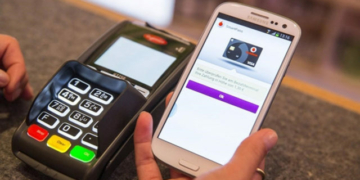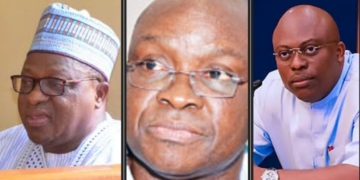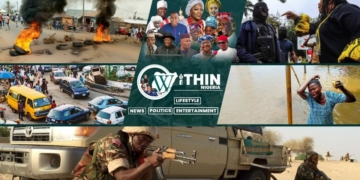October has been marked by several significant national events. From protests on Independence Day to rising fuel prices and a bill proposing the establishment of a university in the President’s name, these developments have attracted public attention and are reshaping the current state of the country. Within Nigeria analyzes them all.
Independence Day Protest
The #FearlessInOctober protest, held in October, was a continuation of the EndBadGovernance protest, which took place between August 1st and 10th. The nationwide protest proceeded despite various controversies.
Sowore, a key figure in the October 1st protest, joined protesters in Lagos State. He stated that the protest was a crucial step towards taking Nigeria to the “promised land”; however, the event saw a low turnout.
“This is one of the actions that will take us to the promised land. We did it in August, and today is a symbolic day to reject their independence as we want our own independence,” Sowore said.
He listed several demands, accusing the current government of imposing severe challenges, including hunger, insecurity, and economic hardship, on Nigerians.
Several protesters were arrested but later released.
Bill Seeking to Establish Bola Tinubu University
A bill sponsored by Deputy Speaker Benjamin Kalu and eight other lawmakers—Inuwa Garba, Nasiru Shehu, Alex Ikwechegh, Bako Useni, Amobi Ogah, Akin Rotimi, Halims Abdullahi, and Felix Nwaeke—proposes the establishment of the Bola Ahmed Tinubu Federal University of Nigerian Languages. It has passed its first reading in the House of Representatives.
This proposal comes despite the current state of tertiary institutions in Nigeria. Nigerian universities have been struggling with underdevelopment, unpaid salaries, and frequent strike actions in recent years.
The President of the Academic Staff Union of Universities (ASUU), Emmanuel Osodeke, recently revealed that 84 of its members had died between May and August this year due to economic hardship and unpaid salaries. He also described the state of tertiary institutions as being “in ruins.”
Nigeria currently has 274 universities, comprising 149 private, 63 state, and 62 federal universities.
A review of the 2024 budget shows that the education sector received N1.54 trillion, representing 6.39% of the total budget, far below the 15% recommendation by UNESCO.
Increase in Petrol and Cooking Gas Prices
The Nigerian National Petroleum Company Limited (NNPCL) increased the pump price of Premium Motor Spirit (PMS), commonly known as petrol, by 15%, raising it from ₦897 per liter to ₦1,030 per liter. This marks the fourth price increase since Bola Tinubu assumed office.
As a result, customers in Lagos will now pay ₦998 per liter, while those in Abuja will pay ₦1,030 per liter. In other southwestern states, the price will be ₦1,025 per liter, and in the southeastern states, customers will pay ₦1,045 per liter.
Nigerians fear that this price hike will exacerbate the already difficult living conditions in the country, making it harder to afford transport and other essentials. The increase in fuel prices has also affected food prices in the market.
Additionally, the price of cooking gas has risen to ₦1,500 in parts of Ogun State and ₦1,400 in some areas of Lagos State.
Super Eagles Face Harsh Ordeal in Libya
The Super Eagles of Nigeria faced a difficult situation at a Libyan airport on Sunday, October 13, 2024, ahead of their second-leg Africa Cup of Nations qualifier against Libya, scheduled for Tuesday, October 15.
As their aircraft approached Benghazi, the control tower instructed the pilot to divert to Al-Abraq International Airport, over 200 kilometers away, despite a prior agreement to land in Benghazi.
The Nigerian squad was stranded for over 15 hours without food or water. As a result, they had to boycott the qualifier and return to Nigeria.





Discussion about this post